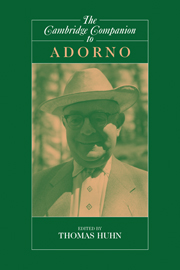Book contents
- Frontmatter
- Introduction: Thoughts beside Themselves
- 1 Negative Dialectic as Fate
- 2 Weighty Objects
- 3 Adorno, Marx, Materialism
- 4 Leaving Home
- 5 Is Experience Still in Crisis? Reflections on a Frankfurt School Lament
- 6 Mephistopheles in Hollywood
- 7 Right Listening and a New Type of Human Being
- 8 Authenticity and Failure in Adorno’s Aesthetics of Music
- 9 Dissonant Works and the Listening Public
- 10 Adorno, Heidegger, and the Meaning of Music
- 11 The Critical Theory of Society as Reflexive Sociology
- 12 Genealogy and Critique
- 13 Adorno’s Negative Moral Philosophy
- 14 Adorno’s Social Lyric, and Literary Criticism Today
- 15 Adorno’s Tom Sawyer Opera Singspiel
- Select Bibliography
- Index
4 - Leaving Home
On Adorno and Heidegger
Published online by Cambridge University Press: 28 May 2006
- Frontmatter
- Introduction: Thoughts beside Themselves
- 1 Negative Dialectic as Fate
- 2 Weighty Objects
- 3 Adorno, Marx, Materialism
- 4 Leaving Home
- 5 Is Experience Still in Crisis? Reflections on a Frankfurt School Lament
- 6 Mephistopheles in Hollywood
- 7 Right Listening and a New Type of Human Being
- 8 Authenticity and Failure in Adorno’s Aesthetics of Music
- 9 Dissonant Works and the Listening Public
- 10 Adorno, Heidegger, and the Meaning of Music
- 11 The Critical Theory of Society as Reflexive Sociology
- 12 Genealogy and Critique
- 13 Adorno’s Negative Moral Philosophy
- 14 Adorno’s Social Lyric, and Literary Criticism Today
- 15 Adorno’s Tom Sawyer Opera Singspiel
- Select Bibliography
- Index
Summary
Wer Keine Heimat mehr hat,
dem wird wohl gar das Schreiben zum Wohnen.
[For a man who no longer has a homeland,
writing becomes a place to live.]
Adorno
Minima MoraliaTaken from a text composed during the Second World War, the above epigraph is a formulation characteristic of Adorno. Aphoristically interweaving the personal and the philosophical, the particular and the universal, it consciously resists seamless integration into the totality of a philosophical system. Expressing his experience as an exile inhabiting what was for Adorno an especially strange life-world, and like many of the other reflections contained in Minima Moralia, it undermines the idea that Universal History could be construed in terms other than as a catastrophic logic stretching from the “slingshot to the megaton bomb.” In this sense, Adorno’s writing constitutes the literary counterpart to atonal forms of the “New Music,” whose partisan he undoubtedly was. For Adorno, who initially studied under Alban Berg in Vienna, New Music becomes not simply a mere analogue or trope but rather the concrete model for a writing that situates itself at the unstable boundary between art and philosophy. Existing precariously at this threshold, Adorno’s writing is deeply suspicious of the impulse to communicate or reiterate a transparent content determined independently of its form of presentation. Yet, at the same time, it must avoid, lest it risk incoherence, a complete submersion in particularity.
- Type
- Chapter
- Information
- The Cambridge Companion to Adorno , pp. 101 - 128Publisher: Cambridge University PressPrint publication year: 2004
- 2
- Cited by



